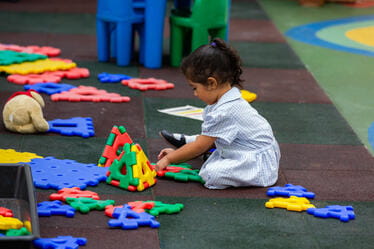The Power of Words
The closure of schools and the limits placed on the socialisation of young children has led to concerns about the development of speech and language skills in Early Years pupils. What can we, as a school, and you, as parents, do to help mitigate this effect?
The closure of schools and the limits placed on the socialisation of young children has led to concerns about the development of speech and language skills in Early Years pupils. What can we, as a school, and you, as parents, do to help mitigate this effect?

The importance of a language rich environment has long been understood within education. Classrooms are bursting with book readings and phonics games, colourful displays of key vocabulary and opportunities for show and tell, but for the last eighteen months many children have been out of school more often than they have been in it. There is a genuine concern that extended periods of social isolation and decreased contact with friends and family may result in an increase in the number of four- and five-year olds who need additional support with language development.
Being able to express your thoughts and feelings clearly, and to be understood, are critical to our self-esteem and confidence. For this reason, building up our students’ vocabulary and presenting them with opportunities to both speak and listen to their peers and other adults has been an even more important consideration at BCB this year.
BCB teachers aim to provide an outstanding model of communication in all of their interactions with our pupils. They support and encourage children with everyday social phrases (Good morning to you! Please come straight in and sit on the carpet!) and questions that provide opportunities for complex responses (Why are you feeling wonderful? Where did you go this weekend?). Subject specific vocabulary, relevant to the current topics and interests of the class, is promoted throughout the school day via displays, conversations and adult-led activities. Role play areas are a standard feature of Early Years classrooms, but their purpose is not only to encourage imaginative play, but also to promote communication skills and the enrichment of the children’s spoken language. For this reason, the theme of our role play areas change regularly throughout the year.

Through observation, our teachers gain a better understanding of each child’s individual interests and use this valuable information to create opportunities for them to learn new vocabulary related to these areas and apply it during everyday talk. This is perhaps the most important consideration for our teachers in developing speaking and listening skills: giving children the time and opportunity to express themselves, and ensuring that they give the speaker (or gesture maker) their full attention.


Language learning neither starts nor ends in the classroom, however. The home, which provides a range of contexts and learning opportunities that are not replicable at school, is a crucially important site of language development. Being playful (and even a little silly!) with language is a great way to get reluctant talkers to open up. Sounds and nonsense words are perfectly valid ways to spark a conversation that could lead to new vocabulary being used or grammatical structures being further reinforced. It is important to be a good model of communication, but not the ‘language police’. If your child makes an error when speaking, try commenting on what was said in a way that allows you to express the idea correctly rather than pointing out the mistake:
“Andre not like it, no.”
“Andre doesn’t like the pasta? Why not?”
Familiar stories and songs are a great way to get children speaking and listening at home. Your child’s class teacher will be able to tell you which books they are reading at school and any songs that are current classroom standards. Regular re-reading of stories and the repetition of songs builds confidence and can also expose children to words that might not feature in their everyday life. How often do you talk about straw, wood and bricks (The Three Little Pigs) for example, or about waterspouts (Incy Wincy Spider) and diamonds (Twinkle Twinkle Little Star)? It is important to remember that as we look to address a potential deficit in communication skills we shouldn’t conflate speaking and listening with other literacy skills, such as reading and writing. These develop at different rates for different children with reading and writing skills usually coming much later. A useful reminder for those eager to promote literacy proficiencies at home is, ‘If they can’t say it, they can’t write it’. Focus on developing a language-rich home environment, one where books are savoured and shared, where songs are sung and jokes are cracked. There is plenty of time to learn how to spell at school.











